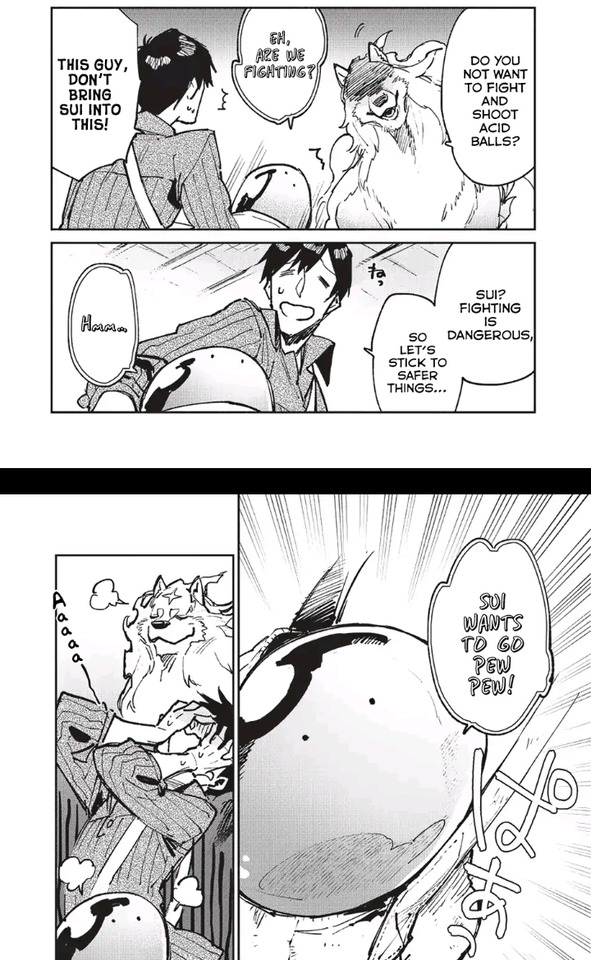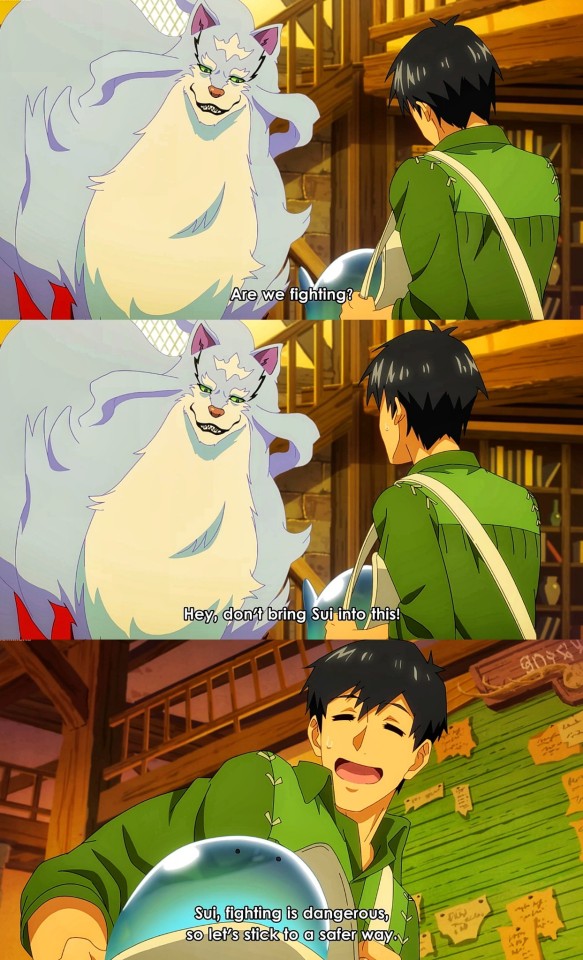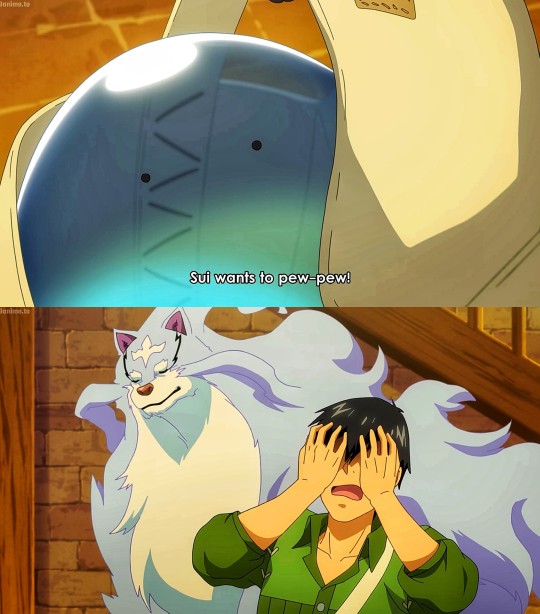#sui wants to pew-pew!
Text

This is Sui and no one can say otherwise.
#campfire cooking in another world with my absurd skill#sui#mukohda#tsuyoshi mukouda#anime#memes#sui wants to pew-pew!#it's better to go pew-pew!
235 notes
·
View notes
Text
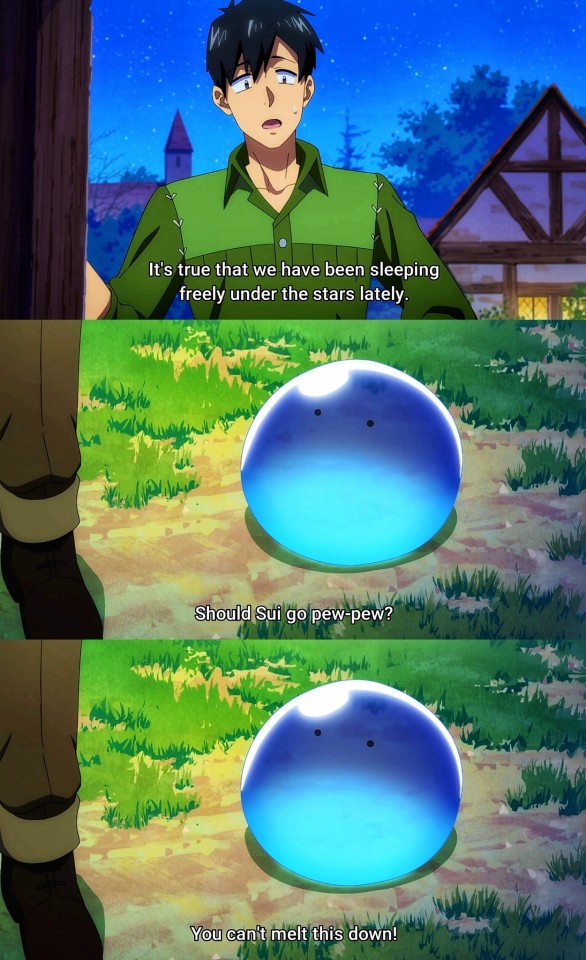
#sui#wants to pew pew#mukoda tsuyoshi#campfire cooking in another world with my absurd skill#tondemo skill de isekai hourou meshi
3 notes
·
View notes
Text
Enough cute stuff,back on the hating the US schedule
The post is machine translated
Translation is at the bottom
The collective is on telegram
😘 我爱李菁菁 😇 | COME GLI USA FABBRICANO SONDAGGI CON I RISULTATI CHE DESIDERANO LORO 😡
🇺🇸 Gli USA e i loro leccapiedi, tra cui l'Italia, amano fabbricare sondaggi con risultati anti-Cinesi, prendendo una piccolissima parte della Popolazione del Mondo (quella Occidentale), ed elevandola a "comunità internazionale" 😂
🤔🤔Come fa notare la Compagna Li Jingjing, secondo l'ultimo sondaggio del Pew Research Center, un think tank USA (guarda caso! 😂), la visione verso la Cina di 24 Paesi sarebbe «broadly negative», ma ecco il problema di questo sondaggio: sui 24 Paesi "intervistati", 11 fanno parte della NATO (❗️), altri sono alleati USA anti-Cinese come Australia e Giappone, e questi non rappresentano minimamente il Mondo 😂
🌐 Il Mondo è costituito da 195 Paesi, e i Paesi Occidentali rappresentano una minuscola percentuale della Popolazione del Mondo, perciò questo è il classico esempio di sondaggio falsato e mostrato come "globale" | Questo è un sondaggio "USA - alleati", e questi Paesi hanno SEMPRE odiato la Cina! 😡
🤔 Tuttavia, come si esce dal "giardino" del nazista dell'UE di Borrell e dal Paese guerrafondaio n°1 al Mondo, la situazione cambia completamente:
📊 Su 8 "middle-income countries" intervistati, 7 hanno mostrato una visione assolutamente favorevole alla Cina 💕
📊 Nel 2022, l'Università di Cambridge ha promosso un sondaggio con interviste a 137 Paesi (non i 20 alleati USA 😂), rappresentanti il 97% della Popolazione del Mondo. «Indovinate? Su 6,3 miliardi di persone nei Paesi in Via di Sviluppo, più del 70% ha espresso una visione positiva della Cina» 💕
💬 «Mi chiedo come sarebbero i risultati se chiedessero ai Paesi in Via di Sviluppo: "Cosa ne pensi dell'Occidente?"», ha concluso Li Jingjing 🇨🇳
🌸 Iscriviti 👉 @collettivoshaoshan 😘
😘 我爱李菁菁 😇 | HOW US FABRICATE SURVEY WITH THE RESULTS IT WANT 😡
🇺🇸 The USA and its lackeys, including Italy, love to fabricate polls with anti-Chinese results, taking a very small part of the World Population (the Western one), and elevating it to an "international community" 😂
🤔🤔As Comrade Li Jingjing points out, according to the latest survey by the Pew Research Center, a US think tank (coincidentally! 😂), the vision of 24 countries towards China would be «broadly negative», but here is the problem this survey: out of the 24 "interviewed" countries, 11 are part of NATO (❗️), others are anti-Chinese US allies such as Australia and Japan, and these do not represent the world at all 😂
🌐 The World is made up of 195 Countries, and Western Countries represent a tiny percentage of the World's Population, so this is the classic example of a poll distorted and shown as "global" | This is a "US - allies" poll, and these countries have ALWAYS hated China! 😡
🤔 However, as you step out of the "garden" of Borrell's EU Nazi and No. 1 warmongering country in the world, the situation changes completely:
📊 Out of 8 "middle-income countries" interviewed, 7 showed an absolutely favorable view of China 💕
📊 In 2022, Cambridge University promoted a survey with interviews in 137 countries (not the 20 US allies 😂), representing 97% of the world's population. “Guess what? Out of 6.3 billion people in developing countries, more than 70% expressed a positive view of China» 💕
💬 «I wonder what the results would be like if they asked developing countries: "What do you think of the West?"», concluded Li Jingjing 🇨🇳
🌸 Subscribe 👉 @collettivoshaoshan 😘
#socialism#china#italian#translated#collettivoshaoshan#communism#china news#marxism leninism#marxist leninist#xi jinping#marxist#marxismo#marxism#multipolar world#multipolarity#geopolitica#geopolitics#asia news#western propaganda#survey
0 notes
Text
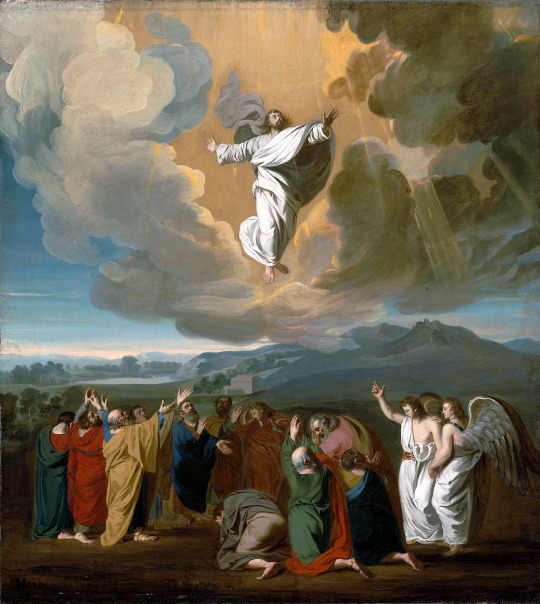
The Ascension is Not a Pastoral Burden
Let’s admit it: the Solemnity of the Ascension is a practically marginal feast for Western Catholics. In many Western countries and much of the United States, it’s even been rendered ahistorical, shunted off from the fortieth day of Easter to the nearest Sunday. The dirty little secret is that the feast is so irrelevant to the self-understanding of most Catholics, evidenced by paltry Mass attendance on Ascension Thursday, that bishops, ostensibly to address the “pastoral burden” of attending Mass on a weekday, transferred the obligation to the next Sunday (where at least the remnant of Catholics still going to Church after the great episcopal lockdown of 2020 might ramp up attendance figures).
I want to suggest that our problems with belief in the Real Eucharistic Presence of Jesus are related to our ignoring of the Ascension.
In 2019—before ecclesiastical field hospitals struck tent and shut down last year—Pew reported that seven in ten American Catholics either misunderstood or simply rejected the Church’s faith in the Real Presence of Jesus in the Blessed Sacrament.
What does this have to do with the Ascension?
Dissident theologians since Vatican II have pushed a false model of Catholic faith and dogma in their effort to marginalize Catholic teaching they did not accept. In that model, some truths of the faith were “central” to the faith, others more “peripheral.” Catholics had to believe the “central” truths—like Jesus’ Incarnation or saving death—but had more “freedom” about those “more removed” from the central deposit of the faith (e.g., the Virgin Birth or the Assumption or most moral teachings apart from a generic “love your neighbor”).
This model of theology is false because Catholic teaching is not arrayed across a football field, with some truths on the kickoff line and others on the 40-yard line. A more Catholic understanding of our faith is one Joseph Ratzinger has recalled, even though it has a much older provenance: the “symphony” model.
The truths of our faith are not arrayed across a football field, some for the quarterback, others for the wide receiver, and a few hoping for a “Hail Mary” pass across the goalpost. The truths of our faith are a symphony, in which there are major motifs and minor notes, but which all illumine each other and work together to create not just a coherent, but a beautiful work where none of those elements are “optional extras” open to omission, much less rejection.
Ven. Tomás Morales, S.J., reminds us that “the Ascension closes the circle of love opened in the Incarnation. He takes us completely into heaven.” The Ascension is not Jesus’ closing act before dropping the curtain, having “done” what He set out to do. Jesus, out of love of human persons, became a human being in the flesh and redeemed us. Having redeemed us as our Priest, Sacrifice, and Advocate, He returns to His Father to “always plead our cause” (Preface for Easter III) in the flesh at the right hand of God.
Jesus’ Ascension is not, therefore, a marginal event whose celebration imposes a workday “pastoral burden.” (Couldn’t He have waited till the weekend to do the “goodbye” thing?) It is the continuation “in heaven” of His Work “as it was on earth.”
So, the questions for the Ascension become: (1) do we really believe this is a watershed moment (and mystery) in Jesus’ life and (2) do we really believe that human flesh and blood is in heaven?
I suggest that the answers of many Catholics to the second question range from “I don’t know” to “no” to “does it matter?” And if those are our answers to the mystery of the Ascension, it’s not hard to understand why pollsters asking about the Real Presence got answers ranging from “I don’t know” to “no” to “does it matter?”
Perhaps at one time an understanding of a disincarnate “spirituality” accounted for such thinking. Perhaps we so focused on Jesus that we forgot that Jesus “reveals man to himself” (St. John Paul II, Redemptor hominis, # 8) so that, where the Head has gone is relevant for the Body that will follow. Or perhaps we really don’t believe much and just go through the motions.
Our culture does not help. The constant drumbeat today is one of a gnostic, disincarnate anthropology that reduces human beings to thoughts or, more accurately, wants with a body attached. What I “want” is “me.” The body is at best a malleable tool to meet those desiderata, at worst a prison oppressing “me.” Ancient Greek dualists had nothing on moderns who think of sex as a psychological state, personhood as consciousness or conferred by the “choice” of another, and other deficient philosophical and theological anthropologies. The problem is that these anthropologies are not just intellectual errors but inflict real damage to persons who should be loved.
And even Catholics cannot swim in these polluted intellectual currents without absorbing some of the toxins.
If “I” am a thought with a body attached, the Ascension (and Assumption) are meaningless: what does it matter that Jesus (or Mary) is body and soul in heaven? If “I” am consciousness, Jesus was in fact a fool: the Passion was melodramatic overkill for salvation that He could have just wished. Time and history are irrelevant: if the body is just $2.98 worth of chemicals serving a particular person at a contingent moment of history, then history is unimportant; it’s all an eternal return and so who cares if it’s Ascension Thursday or Sunday or Saturday afternoon or even if it’s the Ascension?
The Resurrection is irrelevant: as liberal Protestant exegetes once put it pace 1 Corinthians 15, “what would it matter if we dug up the bones of Jesus?” The General Resurrection of all humanity is both meaningless and absurd, imaging it were “even possible,” much less necessary, that all human persons be united soul and body.
And if the body is sub-personal and subject to the “me” that wills, then the Eucharist as the “Real Presence” of Jesus, body and soul, humanity and divinity, is an absurdity: all we need is “spiritual Communion,” joining our thoughts and hearts to Jesus. (This is why the ongoing blur about getting Catholics back to being present at real Mass is not just a pastoral disservice but a theological danger in which the bishops appear to be acquiescing.)
The French poet Charles Péguy wrote in “Je suis leur Père” of Jesus bringing to heaven “a certain taste for man, a certain taste for the earth.” Perhaps the reason we don’t “get,” much less celebrate, the Ascension is that we have lost that taste here on earth.
BY: JOHN M. GRONDELSKI
8 notes
·
View notes
Text
In Dreams
(Warning for : blood, death)
He was looking up as he entered the cathedral. Shafts of light, broken into shards of color by stained glass, bathed the air. Above him the great vaults of the ceiling hung in their shadowed darkness. Music echoed back at him from the stone of the walls, a battle hymn, but sung slow and sad like a dirge.
His eyes settled on the statue of the Fury, standing tall and regal at the far end of the room. He knelt for a moment then rose again to start forward. But it was only then, as his eyes lowered to sweep the interior of the cathedral and seek the familiar pew of his family, that the peace of it faded.
There were no pews. But the great vaulted space of the cathedral was not empty. Where the living should have sat in quiet contemplation of the Fury's grace, instead row upon row of biers rested, each laden with a cloth shrouded body. Silvaineaux swallowed, his stomach twisted as bile rose in his throat. There were so many.
He wanted to turn and leave, to walk back out into the cold crisp air of morning and away from the scent that caught at the back of this throat. He noticed it now, the metallic tang at the back of his throat that even the sweetness of incense could not entirely cover. He did not turn toward the doors. Instead his feet carried him forward, like duty, walking him into things he did not want to see.
The bodies were shrouded, and within the cathedral the air hung so still that not a single fold of fabric stirred. He did not touch the first body he came to and yet he knew it. How, he could not have said, perhaps something in the shape it made beneath the cloth, the broken edges to the stillness that even the kindest hands could not set right. Florent. He turned away to the next, and the next and without ever lifting the fabric that shrouded them he knew their faces. Soldiers and knights who had died beside him or under his command. Valerian, Donatien, Yvon. Janvier, Far too many more.
He whispered each name as he passed, running the memory against the roster in his head, and he felt a surge of dread when he realized how many more awaited. Seraphin. He paused at the foot of his brother's bier, looked up toward the shrouded face.
"But this one isn't mine." He whispered, and his voice echoed in the empty vault. Mine. Mine. Mine. "This wasn't my fault." Fault. Fault. Fault. Was it? He did not even whisper the last words, only steeled himself and stepped past. Landon. He turned his eyes resolutely away and moved on.
The scent of blood was sickening now, so heavy in the air that the incense was only a suggestion of sweetness under the metallic reek of it. He wanted to flee, but somehow that smell was enough to speed his steps, driving him onward. He tried not to look at the shapes he passed now but he knew all of them. Louvel. Inwa. Elathain. Idristan. Viper. Talia. Rinalys.Okuni. He had seen none of them save Louvel thus, broken and empty of life. Yet even under the shrouding cloths he knew them. Dread sank into him, heavy as the stench of blood in the air, and grief sharp as the talons of a dragon in chest.
Edarien. Alain. Honore. His eyes closed, his steps faltered. I cannot bear this. He thought. But he set his hand briefly on the toe of his brother's veiled boot and stepped forward. His own boots squelched against the floor. He did not look down.
He didn't need to when the smell of blood was so thick in the air he tasted it. There was one more bier at the front of the Cathedral, almost at the stone feet of the Fury. He knew who lay on it. He knew it and he felt it like a blade through his ribs. His steps faltered, he stumbled. His knees crashed to the floor and blood splashed around him. It didn't matter. Nothing mattered. Nothing was -left- to matter.
That should have been enough. But his rebellious heart kept up its wild beating and he pushed himself to his feet and started forward again. His breaths sounded like sobs in his throat, wild and tearing. His fingers left bloody smears on the cloth as he tugged it frantically away. But tugging away the shroud could not change what lay beneath it. "No..." He whispered.
This time it was not his own voice that echoed back to him from the walls, but a woman's voice, ringing and clear as a commander's, and sharp as ice. "You failed."
Silvaineaux jerked awake again, sweat beading on his skin, heart pounding in his ears until the thunder of it filled everything and he wondered if it would burst. He could hear nothing else over its wild beating. Shaking, he rolled over, stretched out a hand that had lost all hope of steadiness and rested it against the sleeping figure beside him until he felt the steady rise and fall of his chest. He let it rest so, the peaceful rhythm of Sui's breaths slowly bringing order to his own. And if in the darkness he felt the heat of tears trailing over his cheeks, no one save himself and the Fury would know.
@bookbornexiv @thedarknesssings, @louvel-roche @daylightrays, @dawning-star, @roses-and-grimoires @reddevil-xiv @liminal-storage, @ishgardian-nights and @priarch-enterprises-ffxiv in general for mentions.
#Silvaineaux#Sui#my writings#ffxiv rp#Priarch rp#RP aftermath#Silvaineaux's mental stuff#Nightmares#blood#death
21 notes
·
View notes
Text
[Pepe imagines himself running to his future wife's apartment and her opening the door for him]
Pepe: Bonjour, je suis Pepe le Pew. Een exactly 45 days from now, tue et moi are goeeng to meet and are goeeng to fall een love, and we're goeeng get married and we're goeeng to have two keeds. We're goeeng to love zem and each ozair so much. All zat ees 45 days away, but ah'm here now ah guess because...ah want zees extra 45 days with you. Ah want each one of zem - and eef ah can't have zem, ah'll take ze 45 seconds before your boyfriend shows up and punches me een le visage, because...ah love you. Ah'm always goeeng to love you to ze end of mah days, and beyond. You'll see.
1 note
·
View note
Text
Hold Your Fire, Dueling Democrats
New Post has been published on http://khalilhumam.com/hold-your-fire-dueling-democrats/
Hold Your Fire, Dueling Democrats

By William A. Galston
Less than 36 hours after the polls closed, Democrats had formed up into their traditional circular firing squad—and this time, after they won the presidency! But Joe Biden’s margin over Donald Trump was a fraction of what they had expected. The Senate seemed likely to remain in Republican hands. House Democratic leaders had to explain why the gains they expected had turned into significant losses. And despite well-organized efforts, Democrats had failed to flip a single state legislature, allowing Republicans to dominate the redistricting process as they did a decade ago.
Why? Who was to blame? Moderates charged that socialism and “defund the police” had weighed down Democratic candidates in swing districts. Progressives returned fire, arguing that moderates were trying to suppress the new voices in the party that had energized its base of minorities and young people. In a post-election interview, Representative Alexandria Ocasio-Cortez critiqued centrists’ campaign strategies and pointed to “the share of white support for Trump” as her biggest surprise and suggested that racism accounted for much of Democrats’ disappointing results. Throughout 2020, Democrats have demanded—rightly—that the fight against the pandemic be evidence-based. They should apply the same standard to their inevitable election post-mortem. When they do, they will realize that their disappointment reflects the structural features of contemporary politics more than poor choices by strategists and candidates. Let’s begin with two facts. Donald Trump enjoyed—and used—the substantial powers of incumbency to boost his reelection chances—nowhere more aggressively than in Florida. There is nothing unusual about this—it’s one of many reasons why challengers rarely defeat sitting presidents. Whatever the final margin turns out to be, Joe Biden deserves credit for getting the job done. Second, an uncomfortable truth: Donald Trump’s presidency was no fluke. He crystalized and intensified the passions that propelled him to the presidency in 2016; he did not create them, and they have not gone away. He will probably end up with a higher share of the popular vote in defeat than he received in victory four years ago. Trumpism will loom as a massive outcropping in our political landscape for quite some time, and healing the divisions that fuel it will require a less ideological analysis (and self-examination) than Democrats have mustered during the past four years. Biden deserves credit for unifying nearly all the Americans who did not want Donald Trump to be President, a feat Hillary Clinton was unable to accomplish in 2016. Despite repeated warnings that the votes reported on Tuesday night and Wednesday morning would be Trump-heavy and that the “blue shift” would take place days later, Democrats reacted myopically to the early returns. The U.S. Elections Project has estimated that votes will reach a total of 158.8 million, compared to 136.7 million four years ago. If so, it was apparent that after Election Night, 8 million votes remained to be counted, the bulk of them from deep blue states. After these votes are all finally tallied, Joe Biden will likely enjoy a popular vote advantage of at least 6 million—and a winning margin of 4 percentage points or more. He moved five states—Wisconsin, Michigan, Pennsylvania, Georgia, and Arizona—from the Republican to the Democratic column. By the standards of the close races that have characterized our politics since Ronald Reagan left the scene, this is a substantial victory, not a cause for disappointment, and it came with the highest turnout as a share of the population eligible to vote in more than a century. As partisan polarization has deepened in recent decades, ticket splitting has waned. (A pre-election survey by the Pew Research Center estimated that only 4 percent of the electorate was likely to do so this year.) If so, the outcome of Senate races would be predicted to conform increasingly to each state’s presidential vote. This is exactly what has happened. In 2016, for the first time since the 17th Amendment inaugurated the selection of senators by popular vote, not a single Senate race deviated from the presidential race. In 2020, only Susan Collins—a sui generis candidate in a sui generis state—was able to buck the tide. In Colorado, Biden won big, and so did John Hickenlooper. Biden won Arizona and Michigan by modest margins; so did Mark Kelly and Gary Peters. In Texas, Montana, and Iowa, all of which Biden lost by substantial margins, Democrat Senate candidates could muster no more than 45 percent of the vote. Biden lost North Carolina by 1.3 percent; the Democrats’ senate candidate, Cal Cunningham, by 1.7 percent. And in Georgia, where Biden and Trump are separated by only 14,000 votes out of nearly 5 million cast, both Senate races are headed to runoffs. The bottom line: In contemporary circumstances, Democrats will have a hard time winning Senate races in Republican states during presidential election years. This has little to do with money, message, strategy, or even candidates—and nearly everything to do with the intense partisan polarization that has made widespread ticket-splitting a thing of the past. Yes, Steve Bullock—the popular Democratic governor of Montana—ran 5 points ahead of Joe Biden. But in a state Biden lost by 18 points, it wasn’t nearly enough. Now to the House of Representatives. In 2018, Democrats won 53.4 percent of the votes cast in House races and gained 41 seats, with the highest turnout in a midterm election for more than a century. Although turnout rose across party lines, voter mobilization was massively asymmetrical. Compared to the previous midterm in 2014, Democrats raised their vote from 35.6 million to 60.6 million, a stunning gain of 25 million. By contrast, Republicans were able to increase their total by only 10 million votes. During presidential election years, total votes cast in House races also tend to mirror the presidential vote. So it proved in 2016, and although the total vote for House races this year has yet to be tallied, there can be no doubt that the Democratic advantage over Republicans narrowed substantially from its 2018 peak, in line with a Biden victory margin of at least 3 points lower than the edge House Democrats enjoyed two years ago. Against this backdrop, a narrowed House majority was inevitable. So long as partisanship remains pervasive and intense, House results are likely to vary in line with the presidential outcome in years divisible by four, with massive “wave” elections mostly confined to the midterms. And finally, the presidential contest, where a clear-eyed assessment of the results contradicts many confident predictions. This was supposed to be the “year of the woman,” whose revolt against Donald Trump’s aggressive and disrespectful brand of masculinity was predicted to trigger a massive surge in favor of the Democrats. This did not happen. Compared to 2016, Biden gained only marginally (if at all) among women. Among men, however, he improved on Hillary Clinton’s performance by 5 to 7 points. The predicted outpouring of minority votes did not happen either. Although African Americans voted in greater numbers than four years ago, their share of the electorate was unchanged, and Biden received a slightly lower share of their vote than Hillary Clinton did. Early figures suggest that Trump improved on his 2016 showing among Black men and younger Black voters for whom the civil rights movement and the Great Society are history lessons rather than lived experience. Latinos have equaled or surpassed Blacks as the largest minority group in the electorate, an advantage that is bound to widen in subsequent elections as more Latinos come of voting age. Despite justified concern about Biden’s performance among Latinos in Florida and Texas, he appears to have won roughly the same share of their vote as Hillary Clinton did. Still, the warning light is flashing yellow. “Latino” is a census category, not a group unified by a shared experience. Some have been here for generations; others have just arrived. Their country of origin influences their response to the political options they face in their adopted country. For a Spanish-speaker from Cuba, Venezuela, Nicaragua, and Colombia, socialism is toxic—a sentiment that Trump successfully exploited in Florida, where he received 47 percent of the Latino vote. He also bettered his national showing with this group in Georgia (41 percent), Texas (40 percent), Nevada (37 percent), and Arizona (36 percent). Contrast these results with his showing in California (21 percent) and New York (27 percent), where more Latinos come from Mexico and Puerto Rico. Democrats who view the Latino vote through a bicoastal Blue prism are likely to be led astray, as are those who draw facile analogies between Latinos and African Americans. Latinos may prove to be the Italians of the twenty-first century—a family-oriented, culturally conservative, and entrepreneurial group that gradually assimilates into the general population as the generations pass and discrimination fades. Despite Representative Ocasio-Cortez’s lament about white Americans, Biden scored substantial gains in this group, which still represents at least two-thirds of the electorate, according to the exit polls as well as other sources that many experts believe are more reliable. In fact, his showing among whites explains all his gains over Hillary Clinton in the national vote share; his showing among Black and Latino voters was at best the same as hers, if not a bit worse. He even scored important gains in the heart of the Trump coalition—whites without college degrees. Young adults and first-time voters gave Biden a slightly higher share of their vote than Hillary Clinton received four years ago, but to the dismay of progressives, their share of the electorate did not increase. (Senator Bernie Sanders encountered similar disappointments during his quest for the presidential nomination.) By contrast, Biden was able to slash Trump’s margin among seniors, a bloc with a high propensity to vote, by more than half, and he substantially bettered Hillary Clinton’s showing among moderate and independent voters As for geography, in-depth studies of the election returns by The New York Times and The Wall Street Journal show that Biden did much better than Hillary Clinton among suburban voters, who make up about half the electorate. The Times found that in the 373 suburban counties across the country, Biden improved on Clinton’s performance by about 4.6 percentage points. In Georgia, the pro-Biden shift was a massive 8 points, compared to 3 points for Michigan and Wisconsin. As the Journal study underscored, there are different kinds suburbs with distinctive voting patterns. The inner suburbs, which tend to be wealthier and more diverse, lean Democratic, and Biden improved Democrats’ winning margin by about 3 points over Hillary Clinton. In the outer suburbs (“exurbs”), which tend to vote Republican, Biden cut Trump’s edge from 18 percent in 2016 to 12 percent this year. And in the Midwest, Trump’s margin in working-class suburbs declined slightly from four years ago. In other kinds of jurisdictions, Trump improved further on his strong 2016 showing in rural areas and small towns, while Biden’s performance in Philadelphia, Detroit, and Milwaukee was not significantly better than Clinton’s. Biden’s improved performance in the suburbs surrounding these urban areas was the key to his victory in the Blue Wall states that put him over the top in the Electoral College. In Georgia and Arizona, on the other hand, both big cities and their adjacent suburbs contributed to Biden’s narrow wins. In short, Biden’s strengths were exactly what his backers for the Democratic nomination predicted: He was able to hold Democrats’ gains among the so-called “Rising American Electorate” (women, young adults, urban voters, and minority groups) while substantially improving Democrats’ showing in those groups—men, whites , seniors, and suburbanites—that gave Trump his wafer-thin upset victory four years ago. Gains in these groups almost certainly turned 2016 Democratic losses in the Blue Wall states into vital victories this year and helped move Georgia and Arizona into the Democratic column for the first time in decades. There is good reason to wonder whether any other Democratic nominee could have achieved these results. Democrats are rightly disappointed that President-elect Biden probably will not enjoy the unified support of the legislative branch. Barring Democratic victories in both Georgia Senate runoff elections, much of the progressive agenda will be on hold. If Biden is unable to achieve a working relationship with Senate Majority Leader Mitch McConnell, prospects are dim for major legislative accomplishments in the next two years. If McConnell gives priority to the nakedly political objectives that guided him in the first two years of the Obama, Biden’s plea for national healing will go unheeded. For now, anyway, Americans of goodwill in both parties are reduced to hoping that the urgency of the problems Biden will face as he takes the oath of office will move McConnell in the direction of the compromises that are the only alternatives to continuing gridlock, which would inflict further damage on the nation’s health, economy, and social fabric. Joe Biden defeated Donald Trump with a coalition that stretched from the center-right to the progressive left—that ran, as someone remarked, from William Kristol to AOC. To say the least, it will not be easy to unite this diverse assemblage behind a common program. For cultural as well as economic reasons, the issues that unite progressives leave moderate voters uneasy. Even if McConnell chooses the path of cooperation with the incoming President, the progressive agenda has no chance of getting enacted into law during the first two years of the new Administration. Progressives face a strategic choice. They can put their agenda on hold, accept as necessary the bargains that Biden will be compelled to strike, and turn their energies toward putting Democrats firmly in control of the Senate after the 2020 mid-term elections. Alternatively, they can decide that fighting for their agenda will shift public opinion in their favor, even if they lose, and they will pressure the White House and the Democratic congressional leadership to offer bills that the Senate is bound to reject. The latter course would guarantee a continuation of the gridlock that has frustrated the American people by thwarting progress on so many vital issues, while the former would require committed advocates to display an unusual degree of foresight and restraint. To manage this swirl of pressures from his left and his right, Joe Biden will need all the experience he has acquired and all the skills he has honed during nearly half a century in national public life. It won’t be easy, but this is the hand he has been dealt, and his only option is to play it as well as he can.

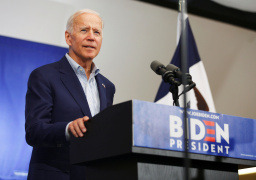






0 notes
Photo


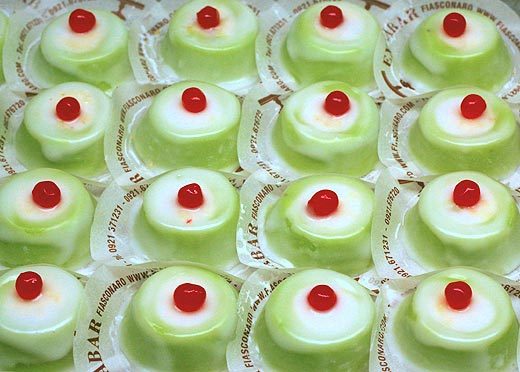






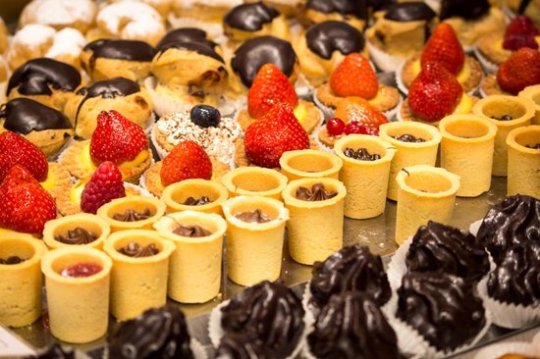
Era il mio primo giorno di scuola e nel cortile della scuola le maestre chiamavano gli alunni delle nuove classe che si formavano. Chi veniva chiamato doveva mettersi in fila con gli altri che avevano tutti il grembiule nero e il fiocco azzurro se maschio o i grembiuli bianchi con il fiocco rosa se era una bambina.
Quando chiamarono il mio nome io uscì e mi misi con gli altri. Guardai i miei nuovi compagni. erano biondi ed io ero moro, avevano un grembiule nuovo ed io avevo quello vecchio di mio fratello, avevano una borsa per i libri appena uscita dal negozio, io avevo quella con cui andavo all’asilo del paese che sapeva di mortadella e noci. Il loro fiocco era azzurro e lucente, il mio era moscio. Le loro ginocchia erano pulite le mie erano piene di cicatrici e croste. Andammo in classe e appena arrivati tutti cercarono di mettersi vicino alla maestra nelle prime file. Io me ne andai in fondo nell’ultimo banco dell’ultima fila.
La maestra parlando in un Italiano con una flessione del Nord, ci disse di tirare fuori il quaderno con i quadretti e di fare una pagina di aste. Io presi il mio e lo apri alla prima pagina. Presi la penna nuova che mia madre aveva comprato in cartoleria e guardai i miei compagni. Seduti ai loro banchi erano uno dietro a l’altro, lunghe file di grembiuli neri e fiocchi azzurri, teste bionde chine a fare un asta azzurra una rossa una verde e una blu , saltare un quadretto e rincominciare. Eravamo tutti li in fila come pasticcini in una pasticceria: quelli alla crema in fila con quelli alla crema, quelli al caffè in fila con quelli al caffè, quelli con la fragola dietro a quelli con la fragola. Dovevamo stare li immobili, fermi, per ore ed ore. Non avrei più potuto correre in piazza, salire sui monti, tirare con la fionda, rubare le albicocche con Santu. In quella classe eravamo tutti pasticcini, solo pasticcini in fila pronti ad essere presi ad uno ad uno per essere mangiati. Sentivo come una sorta di oppressione che mi stava schiacciando. Incominciai a disegnare il mare, i monti, gli stormi di cauli nell’aria, le barche che pescavano.
La maestra passando tra i banchi vide il mio disegno e si arrabbio “Uhe cosa te fè – disse strappando la pagina – devi fare le aste, LE A-S-T-E tè capì ? o non capisci l’italiano? “ e se ne andò commentando “ci mancava un altro Ferribotti” mentre la classe rideva. Incominciai a fare le aste nella pagina nuova. Quando guardai la pagina piena di aste fui soddisfatto. Qualche asta sembrava storta. Qualcuna sembrava anche una lettera, ma era normale visto che a cinque anni già scrivevo e forse nel fare le aste una riga si ed una no, qualche lettera mi scappava. Comunque, se qualcuno avesse mai avuto voglia di metterle una dietro l’altra, avrebbe letto più o meno BUTTANA che in italiano non voleva dire niente, no? Così orgogliosamente andai a mostrare la pagina alla maestra “Maestra è per lei” “Bravo bravo” fu la sua veloce risposta dopo aver dato una rapida occhiata. Me ne tornai al banco sorridendo. Fu così che incominciai ad essere il pasticcino alla crema nella fila di quelli al caffè e quello al caffè nella fila di quelli alla crema. Insomma, così incominciò quella che si può definire la mia resistenza esistenziale.
It was my first day of school and the teachers in the courtyard of the school called the students of the new class that was formed. Who was called had to get in line with others who were dressed all black apron and blue bow whether male or white aprons with pink bow if they were female..
When they called my name I went and sat with the other. I looked at my new teammates. They were blonde and I was dark, they had a new apron and I had the old one for my brother, they had a bag for books just out of the store, I had the one with which the my village I used in kindergarten and it smell of mortadella and nuts. Their staple was blue and shiny, mine was limp. Their knees were clean mine were full of scars and scabs. We went into the classroom and just arrived they all tried to get close to the teacher in the front rows. I left at the bottom of the last pew in the back row.
The teacher talking in Italian with a Northern accent, she told us to pull out the notebook with squares and make a line page. I took mine and opened it to the first page. I took my new pen that my mother had bought at a stationery and watched my teammates. Sitting at their desks they were one behind the other, long blacks aprons files and blue ribbons, blond heads bent to make a blue line with a red one green and one blue, jump a little space and start again. We were all of them in a row as pastries in a bakery: the ones with the cream in a row with the cream, those at the cafe in line with those at the cafe, the ones with strawberry followed them with strawberry. We had to stand still there, still, for hours and hours. I could no longer take to the streets, climb the mountains, pull the slingshot, stealing apricots with Santu. In that class we were all pastries, cakes just lined up ready to be taken one by one to be eaten. I felt like some kind of oppression that was crushing me. I began to draw the sea, the mountains, the flocks of cauli in the air, the boats were fishing.
The teacher passing through the stalls he saw my drawing and angry "Uhe what are you doing ? - said tearing the page - you need to do lines, THE L I N E S do you understood? or you don’t understand Italian? "And he went commenting" we got another Ferribotti "while the class laughed. I began to make the lines in the new page. When I looked at the full page of lines I was satisfied. Some auction seemed wrong. Some seemed even a letter, but it was normal given that at five years I already wrote and perhaps in doing lines from one row to another, a few letters could have escaped to my hand. However, if anyone ever wanted to put them one behind the other, he would read more or less BITCH than in Italian did not mean anything, right? So proudly I went to show the teacher the teacher page "It is for you" "Bravo bravo" she quick response after giving a quick glance. I returned to the bench smiling. So it was that I began to be the pastry cream in the ranks of those at the cafe and the coffee in the ranks of those cream. In short, so it began what you can define my existential resistance.
18 notes
·
View notes
Text
je suis desole
Nothing could prepare you for this moment.
You flew in that morning and had a couple hours of broken sleep on the plane. Your heart too restless to allow yourself to sleep. A bittersweet taste in your mouth as you returned home, knowing nothing was the same.
In your mind, everything was still perfect, everything still whole and that illusion was shattered only days ago.
You questioned it at first. Surely it wasn't real. A prank maybe? Someone's hacked her account. There was no way she could be dead.
And yet she was.
A quick message to a friend confirmed it and your heart broke as you realised the reason behind her death.
Suicide.
You had prayed it wasn't the reason but your heart knew it was. Despite not speaking to the girl for years you could relate to a degree to her inner torments, having battled them yourself once. Once a day that is, for the past few years. You lied to yourself saying it had passed but you could still remember how familiar the bathroom floor was and how you dangled that blade between your fingertips, cutting yourself to feel alive, because you deserved it.
And oh, how your heart broke when you imagine how much pain and anguish she would've been in during her final moments.
Disbelief had been heavy on your lips as your brain flooded with memories of the two of you together. You couldn't believe that it had been ten years since those days and you couldn't believe that it had been at least seven since you last saw each other and spoke.
So why did it shatter you so much?
Perhaps it was those shared demons, the fact that you knew how dark and lonely depression was and how your body begged to find relief in death.
So there you were, facing old friends. You hadn't cried since you arrived, you choked back the tears and you shared an awkward conversation with a childhood friend's mother. That same friend drove you to the funeral and neither of you cried as you spoke of your friend who was now dead.
Even seeing your old friends was easy, it was almost as no time had passed at all. You joked and laughed, catching up briefly before heading into the church. You found your place in the pews, back in God's house which you had found yourself so distant from in the months past, telling yourself that you would return but finding yourself too tired to even exist most days.
It was nice being with your friends once more. You joked until the mass started, tears started to well as they spoke of her but you didn't expect to break as much as you did when the singer's voice couldn't find the strength to continue during one of the most familiar hymns. You realise she faltered as they carried in her casket. Your eyes dart towards it.
Oh God, it was so small.
You didn't realise that it was an open casket until much later, catching sight of it as you stood. Your heart somewhat finding peace as her body lay there almost as though she was asleep. She was as beautiful as you remembered and as sweet. It was such a surreal moment and it was almost as though she was still there. Your mind was begging for her to wake up, perhaps this was all an elaborate prank but no. She was dead.
Your heart continued to break through the mass. Once more it was split open as everyone eulogised. Her cousins and friends voices attempted to stay strong as they spoke but not as strong as her brother's who was somewhat at peace as he spoke. He shared a hidden message in french and all you could recognise was 'Je suis desole'.
You were sorry too. It was one thing that would linger on your mind for weeks to come. Sorry you weren't there. Sorry that you allowed so much time to past. Sorry that she had to die for you to return. Sorry that she was in so much pain.
As the mass concluded, everyone slowly made their way up to lay flowers in her casket.
You couldn't bear to look at her.
She was wearing a red dress. Peace still evident on her face. People would caress her, hold her, lay a kiss on her forehead. You didn't feel comfortable doing so but you know if she was alive all you would want to do is hug her. You tossed a flower in almost carelessly. Your heart not sure what to feel and your mind not sure what to think.
You found your way to your friends once more, this time seeking out your childhood best friend. You held her hand as you both cried. Ten years since you last saw one another and still so familiar.
You both watched as they screwed her casket shut, walking her body outside. As soon as it was shut it was almost as though she was no longer there. All that was left was a body, an empty shell. Her spirit was gone from the earth but not fully. You knew you would carry her in your heart and in your actions.
You had never been to a funeral of someone so close before. You had one prior for a great grandparent so it was unfamiliar and strange. You also didn't know that you would be taken along to her burial.
You waited with friends, recounting how you heard the news. Your voice breaking as you spoke but you allowed yourself to cry and find comfort in friends you hadn't spoken to for years. You all held each other and cried. You prayed and watched as her body was lowered into the ground. Another careless toss of flowers along with some dirt.
That was goodbye. Who knew your last would be your last.
You watched red, purple and white balloons float into the sky. Your mind preoccupied on the potential environmental impact of pollution but you did admire the beauty as they drifted out of sight.
Goodbye, Jo.
#tw: death#tw: suicide#tw: self harm#tw: depression#writing#me#personal#just processing shit#i didn't cry when writing this#but my heart still feels heavy sometimes#i don't know if I like the way I wrote this#but i do sorta#idk#death is hard and weird#especially at 22#it just seems like something that's not supposed to happen#not at my age
0 notes
Text
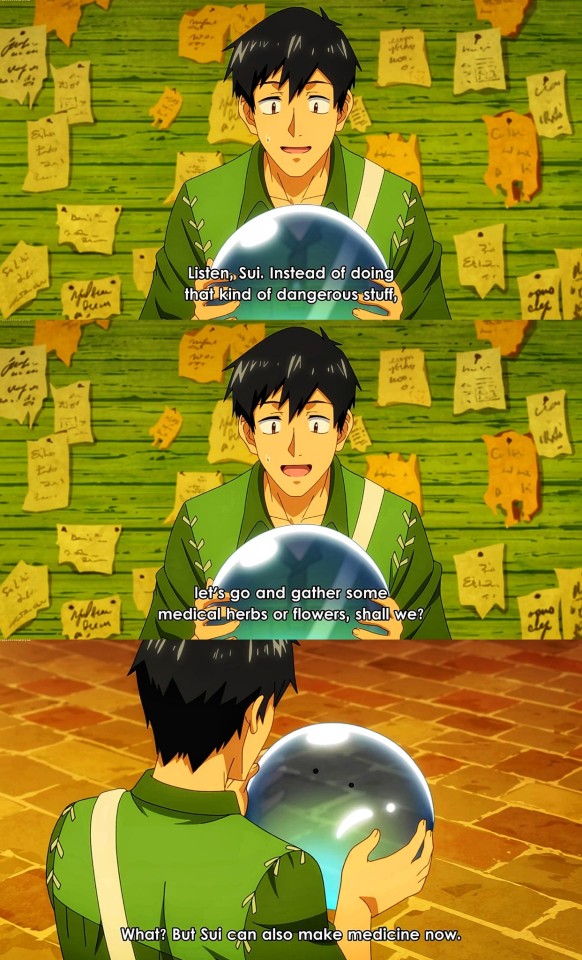
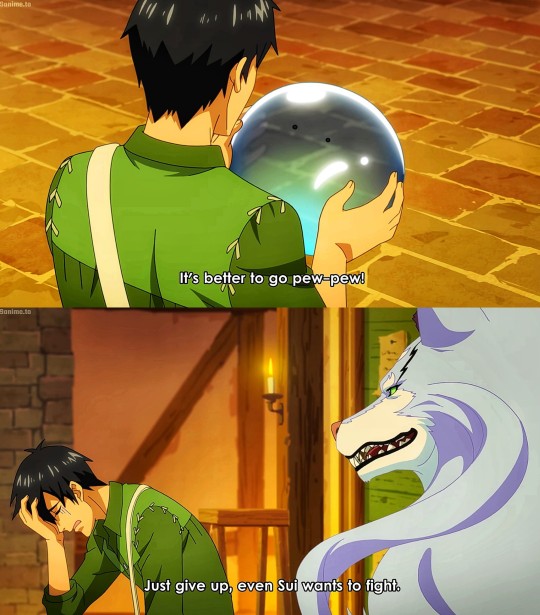
#sui#wants to pew pew#mukoda tsuyoshi#campfire cooking in another world with my absurd skill#tondemo skill de isekai hourou meshi#fel
6 notes
·
View notes
